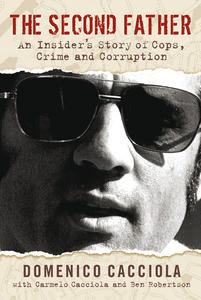 | Domenico Cacciola Second Father: An Insider's Story of Cops, Crime and Corruption University of Queensland Press, 218 pp. Source: review copy Review by Michael Freedman |
Regrettably, for the longest time it seemed that the words "Queensland Police" and "corruption" were synonymous. Seemingly, "racism" is also a word that is indelibly imprinted in the annals of the Queensland police force. This is certainly the impression gained from reading former Queensland cop Domenico Cacciola's memoirs of his time on the force, curiously titled The Second Father. (This has nothing to do with corruption, but simply refers to the fact that Cacciola is the eldest of four boys). It is to be hoped that since Mr Cacciola's experiences, things have changed.
As these are memoirs, the author follows the usual course of devoting the initial chapter to his early life, before writing about his experiences with Queensland police from Chapter 2. From a fresh-faced rookie, Cacciola spent 35 years in the service of Queensland Police until his retirement in July 2001. On his account, the intervening years were excruciating, the narrator seemingly spending more time fighting corruption from within his own Force than fighting crime outside it. Clearly, it is not easy being an honest cop inside a den of thieves.
Perhaps Cacciola's closeness to his family allowed some respite from the horrors he was facing at work, but it is worth reflecting that he was at times working undercover. There was a limit to how much he could confide in his family. The loneliness and isolation must have at times been unbearable. It speaks volumes about Cacciola's character that he was able to make it through the other side without succumbing to bitterness and regret.
In his preface, the author tells us that names and identifying characteristics have been altered for some of the characters in the story. While this is no doubt a necessary evil, if for no other reason than to avoid legal problems, it struck me as ironic that, in a tale about a honest cop adrift in a sea of corruption, certain information was altered or, presumably, withheld altogether from the reader. This aside, however, the author delivers what appears to be a warts and all account of a life spent in a state of mistrust of a number of his colleagues and supervisors. Once it became clear that Cacciola was an honest cop, the mistrust became mutual.
At no stage is the impression given that Cacciola's skills, while no doubt considerable, lie in writing. On the basis of The Second Father, it seems difficult to imagine a gripping novel coming from the author's pen. A gripping autobiography, however, is easier to imagine because that fully describes The Second Father. Partly, this is because of the material, which with the recent Melbourne gangland murders and consequent allegations of gangland corruption, is quite topical. Being in constant physical danger from those in whom Cacciola should be able place significant trust automatically conveys an element of excitement. But I think it is in the author's honest, straightforward, "leave nothing out and let the reader come to his or her own conclusions" approach, that makes The Second Father more than simply memoir. It is a cautionary tale for the naïve, a reminder that power corrupts and the more power a person has the greater the avenue for that corruption. Even for someone who is aware of the extent of the corruption allegations against sitting and retired Queensland police officers (who can forget the Fitzgerald inquiry) Cacciola's words are an eye-opener.
